Summary 
A quaint pastel setting - with ragtime-inflected music and songs from the 1920s and 1940s - for an entertaining outdoor production anchored by an excellent portrayal of Sir Jack Falstaff. Supporting performances range wildly - several over-the-top cartoons contrasting with understated small-town folk - while a charming Hostess Quickly orchestrates all the conspiracies against the fat Knight. Colorful entertainment, with a usually laborious final humiliation scene in the Windsor woods here an inspired musical dance sequence.
Design
Directed by Catherine Weidner. Costumes by Rachel Laritz. Set by Fred M. Duer. Lights by Julie Mack. Sound by Jason Knox.
Cast
George Judy (Falstaff), Chris Amos (Bardolph), Kevin Rich (Host), Brian Rooney (Parson Hugh Evans), David Sitler (Justice Shallow), Drew Vidal (Slender), Max Ganet (Simple), Kareem Bandealy (Ford), Demetria Thomas (Mistress Ford), Patrick New (Page), Kathy Logelin (Mistress Page), Katrina Kuntz (Anne Page), Benjamin Cole (Fenton), Magdalyn Donnelly (Mistress Quickly), Gerson Dacany (Doctor Caius).
Analysis
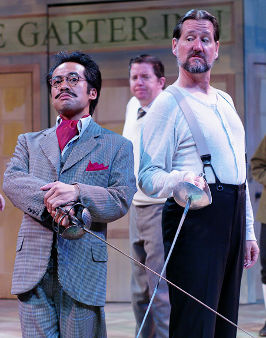
Catherine Weidner's outdoor The Merry Wives of Windsor at the Illinois Shakespeare Festival is updated to pre-World War II, the women wearing flowing flapper dresses with lace fringes and long sleeves along with hats and high heels, and the men sporting vested suits with suspenders and wing-tip dress shoes along with rakish hats. With a ragtime piano musical score and songs from the period - including "Chattanooga Choo Choo" during intermission - the setting is quaint, featuring a pastel-painted two-story backdrop of The Garter Inn alongside Doctor Caius' office upstage. Doors and panels open to reveal the walls of interior settings, and fake windows shimmer above, used by Weidner to good effect, as when she shows the silhouette of the lovelorn Fenton in 4.4 sobbing as he witnesses from above all the romantic pursuits of his beloved Anne Page below. A newspaper deliveryman on a bicycle flings rolled-up tabloids during set changes, and white picket fences mark entrances to the stage along with two-dimensional green-painted bushes.
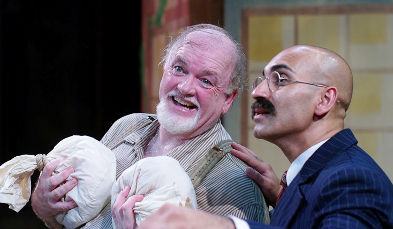
Weidner anchors her production with a remarkable performance by George Judy as Sir John Falstaff, the big Knight played with restraint as an articulate and aging old Englishman with a clever wit rather than with comic bombast as a blowhard fool. Judy lends Falstaff considerable intelligence and sympathy, a sad-eyed intellectual with a commanding presence but well beyond his prime: he arrives to the ragtime piano theme ahead of creditors 1.1, a gray-bearded man with a big belly, his hair a fly-away wispy white, and with an array of military medals pinned to his vest. After his henchmen pass his luggage among them like slapstick servants, Judy's swaggering Falstaff takes over The Garter Inn, plotting to woo both wealthy wives - "we shall thrive!" - and showing peevish anger at the refusal to deliver his letters: "vanish like hail stones, go!" Judy's Falstaff blusters with a twinkle in his eye, his rapacious old knight a delight as he struts and points at Bardolph, struggles with the heavy bag of cash brought to him by Ford, then dances gaily with the seething husband. When Ford swings a bottle of sack at his head, Falstaff casually turns just in time to catch the bottle in an outstretched hand and slap it on a table.
Judy's Falstaff's best scenes are the second-act wooing debacles. He arrives 3.3 in a brown suit and wing-tipped shoes, his hat at a jaunty angle, wielding like weapons a bouquet of flowers and a red-foil heart-shaped box of candy. He flings the flowers and embraces Mistress Ford to dance, but sends her sprawling when he strains his back in an attempted "dip." When her angry husband is heard approaching, Judy's enormous Falstaff slumps in an easy chair in an attempt to hide, pulling his hat over his face before sliding to the floor and pulling an end table atop himself. He then shimmies on his hands and knees through the Ford living room - "look, here is a basket!" - before being stuffed into an over-sized wicker basket and covered in piles of dirty underwear. When the servant boys struggle to lift the container laden with the fat Knight, Falstaff's feet pop out of the bottom and he helps them walk offstage (only to be tossed in the river). And in 4.2, after a howled "Nooo!" at the mention of hiding again in the basket, Judy's Falstaff lumbers offstage, only to return in drag wearing a polka-dot purple dress with sash, black high-heels and stockings, and a dark-feathered black cap, concealing his face with a green silk scarf. Paddled with an oar by Ford, he yelps in a high-pitched voice and prances out of the scene.
Weidner takes an entertainingly schizoid approach to the supporting characters, some of them underplayed with a laid-back small-town calm, but most ramped-up into cartoonish frenzy. Even small supporting roles are infused with an over-the-top corniness, like the old creditor Shallow, stooped over 1.1 and shuffling, peering from behind glasses and swinging his cane like a weapon - "the sword should end it" - in a foot-stomping hammy bluster. Shallow does get a big laugh in 4.2, when he approaches the out-of-breath Falstaff, still in drag, and demands partial payment: "let me have half my one thousand...plus the shoes." The foppish Slender plays like a boyish version of Shallow, wearing a white suit with gloves and a straw hat, towering tall and well, slender, simpering and stammering as he is picked on by Falstaff's men, who shove him between them like schoolyard bullies.
Doctor Caius, in particular, is played as a screwball cartoon, certainly audience-pleasing but totally lacking any sense of subtlety. Gray-suited with a red handkerchief, the diminutive Caius features big black hair and mustache along with dark plastic spectacles, and he quickly gestures in stiff poses, loudly over-enunciating in an absurd accent. During 1.4 at his office, he raises his arms in a pseudo-karate pose and cries out "villainy," then is wheeled offstage while astride the couch, posing at the front with his arm up as if leading a cavalry charge, shaking his fist in the air. During 2.3, his hyper-charged animation contrasts with the laid-back small-town folk - "vat is de clock, Jack?" - as he provides his own sound effect when he draws his sword for a duel. In 3.1 the duel finally takes place - "let-a me speak a word with your ear" - but he is seized by the arms and lifted off the ground away from the fight, and he squeals in frustration, his legs still running like a human cartoon though his feet do not touch the ground. Caius finally relents 3.4 - "I shall make the t'ird" - and joins the others to audience applause, the performance amusing but always played one-note and at the same zany speed.
Kareem Bandealy has more success with his manic and hyper-jealous Ford, who is forced to be subdued when in disguise as "Brook." When told 2.1 of Falstaff's plot to seduce their wives, Page seems unworried and even amused, but Bandealy's Ford looks fearfully into the audience as Falstaff appears in a window high above stage right, singing Cole Porter's "Birds Do It, Bees Do it." During 2.2 Ford rips off his fake mustache - "oow!" - and addresses the audience with his index fingers making a cuckold's horns. At the end of 3.5, he splashes himself with sack before going into the first rows of the audience - "this is to be married" - and pointing at himself: "ta da!." The stop-and-go histrionics work well onstage, as when Bandealy's Ford exits to end 3.5 in a huff, then re-appears during the ensuing scene change to stomp off in the correct direction. The figurative wheels begin coming off Bandealy's Ford, and by 4.2 he has become violent, taking his servant boys by the ears and popping their heads together, and in 4.4 he is literally falling apart, dripping with so much sweat his fake mustache begins to slip from his lip.
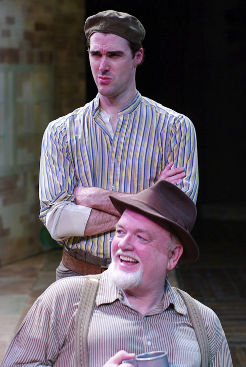
In contrast to the high-energy hambone style, some of the supporting characters are directed by Weidner with a tranquil rural bemusement. The tall and lanky Bardolph, for example, is a wry but almost always silent bartender in striped shirt and suspenders, watching and listening as he wipes drinking glasses with a bar towel or mixes martinis in a shaker 2.2 for the titular wives, pausing for a swig himself, right from the silver-metal shaker. He serves Falstaff a bottle of Glenlivet whiskey in 3.5, amused by the wry Falstaff's comment on the romantic adventure - "I have an alacrity in sinking" - as he lathers the Knight for an old-fashioned wet-shave. Similar down-home country charm exudes from Page, a 1950s-style sit-com Dad in sweater vest over shirt and tie, with belted slacks and dress shoes, and from the simplistic Simple, who walks around hands-in-pockets and peering in windows, silently apes the antics of Doctor Caius, and responds with a "huh?" to the remark, "as simple as I stand here."
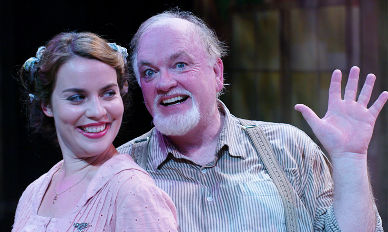
Among the more prominent supporting characters, Kathy Logelin fairs well as Mistress Page, deftly applying moments of over-the-top energy to her rural housewife persona. She gulps a martini 2.1, greets her girlfriend Mistress Ford with a sonically high-pitched "hi!" and a wave, and during the 3.3 romance, she runs in a panicked circle, hides behind nothing, then flees, bending far over as if passing next to a large picture window. In 4.2, she imitates Ford's bluster with a comically foot-stomping display of his tight-fisted muttering. Even better is Magdalyn Donnelly's sexy and sly Hostess Quickly, stealing scenes with her expressive but naturalistic plotting. All the conspiracies against Falstaff flow through her, and she seems to be hatching a romantic plot of her own, twitching her hips as she walks away from Falstaff or sticking out her chest for him. Donnelly's lusty Quickly, when kissed by Falstaff full on the mouth 2.2, staggers and swoons, and she sits in his lap during the 3.5 shave, each taking a tongue-lap taste of the shaving crème right from the brush. Her casual asides endear, as when she sticks her tongue out - "ugh!" - at the 3.4 thought of Slender wooing Anne, gestures proudly to herself at the love between Anne and Fenton - "this is my doing!" - and makes a Freudian slip in complimenting him: he is "such a kind wart...I mean heart." Donnelly's Mistress Quickly continually charms, chuckling at the word "quickly" in 3.5 - "it's my name!" - pursuing Falstaff in 4.4 as he flinches from her very touch, then cooing an erotic "oh!" as she pulls a length of metal chain from her blouse to bind Falstaff with, then wears it around her arms like a dominatrix shawl.
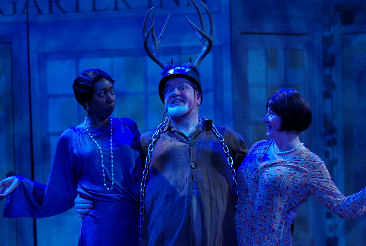
Weidner imbues her production, and all its uneven performances, with a decided sense of inventive fun: for example, every appearance of the lovely Anne Page incurs heavenly harp strings, until characters are looking up, down, and around for the source of the angelic music, until finally Anne herself uses a throat-cutting motion to kill the sound effect. Weidner's ingenuity is at its best in the final 5.5 humiliation of Falstaff. The scene itself, ponderously written and repetitive after the two previous humiliations of the old Knight, plays typically in blue moonlight, with the townspeople fairies arriving in horned caps and grass jackets, the nine of them creeping along with orange-light fingers on their gloves. When Judy's Falstaff appears, he seems proud in his brown robe and metal chain, wearing a war helmet with antlers. Panicked at the sight of the spirits, he decides to be "disguised as a forest tree" and strikes a bug-eyed idiot pose with his hands in the air like tree branches. Weidner's scene becomes inspired entertainment when the fairies clasp hands and dance in a circle around the statue-tree Falstaff, poking him with red-ended sticks and twigs. The townspeople of Windsor then break into a song - "there's a fire!" - and dance in choreographed moves that recall a music television video, the mistresses dancing downstage with their husbands, one couple on each side.
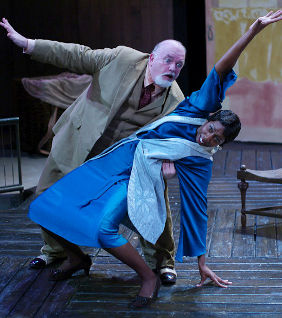
The production concludes with Falstaff humiliated over and over - Parson Hugh delivers an exorcism with a Bible-thumping "can I get a hallelujah?" and pokes him with his cane until the old Knight squeals - then Mistress Ford pipes in ("I'll always count you my...dear") and Bandealy's Ford shows him a finger-mustache to reveal his deceit as "Brook."
Ford himself manages to calm Page - "in love the heavens themselves do guide the state" - as Fenton is united with Anne, resplendent in a shimmery orange dress with matching sash and headband. The townspeople and reconciled couples all exit, and Weidner even provides a happy ending for Judy's beleaguered Falstaff, as he and the giggling Hostess Quickly start to follow, but then embrace and cavort offstage in their own direction.